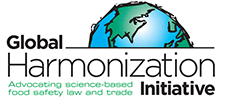
Nomenclature on Food Safety and Quality Working Group
Nomenclature on Food Safety and Quality Working Group
Co-chairs

Dr. Ileana Negrutsa
Russia

Prof. Dr. Dmitry Kulev
Russia
Mission
The mission of the Nomenclature on Food Safety and Quality Working Group (WG) is to aim to harmonize definitions in the above areas. A stepwise approach will be adopted, starting with a few basic languages, initially Russian and English, and then Spanish, French and Italian. It is hoped that this will stimulate a desire for consensus leading to the minimization of rejection of food at borders because of non-compliance with local regulations and of negative effects on consequential business and finance.
Topics & Objectives
In food laws and regulations, many expressions or terms are used but these vary in length (even when expressed in a common language, as below for ‘Food Additive’), in exclusions and in precision.
- Japan
Substances used in or on food in the process of manufacturing food, or substances used for the purpose of processing or preserving food. [23 words]
- USA
Any substance the intended use of which results or may reasonably be expected to result -directly or indirectly - in its becoming a component or otherwise affecting the characteristics of any food. [32 words]
- Canada
Substances that, when added to the food, can become part of the food or alter its characteristics, with the exception of mineral nutrients and vitamins (added to enhance nutritional value), spices, seasonings, flavourings, agricultural chemicals, and substances added to the packaging material. [42 words]
- European Union
Regulation (EC) No 1333/2008 (Article 3 (2 (a))
Any substance not normally consumed as a food in itself and not normally used as a characteristic ingredient of food whether or not it has nutritive value, the intentional addition of which to food for a technological purpose in the manufacture, processing, preparation, treatment, packaging, transport or storage of such food results, or may be reasonably expected to result, in it or its by-products becoming directly or indirectly a component of such foods. [74 words]
- Codex Alimentarius
Any substance not normally consumed as a food by itself and not normally used as a typical ingredient of the food, whether or not it has nutritive value, the intentional addition of which to food for a technological (including organoleptic) purpose in the manufacture, processing, preparation, treatment, packing, packaging, transport or holding of such food results, or may be reasonably expected to result (directly or indirectly), in it or its by-products becoming a component of or otherwise affecting the characteristics of such foods. The term does not include contaminants, or substances added to food for maintaining or improving nutritional qualities, or sodium chloride. [103 words]
This situation, magnified when other languages and nuances are considered, is a means for confusion. Our activity will help eliminate misconceptions and confusions in the field of food safety and quality, minimise barriers for food product import and export, and facilitate marketing and science-based claims. It will also help create a unified field of terms necessary for cross-border legal practice and social advancement.
The global nature of GHI and the experience and reputation of its many members may offer a means of harmonising these for the benefit of food manufactures and traders, local and regional economies, and consumers. Potentially there is an opportunity to produce a Glossary in electronic and printed format.
The areas to be covered are broad and include:
- Food (definition)
- Raw materials
- Micro-ingredients
- Technical processing aids (incl. lubricants)
- Food flavours
- Information on labels and packages
- Hygienic and aseptic processing of food
- Shelf life
- Legislative and regulatory authorities (abbreviation and explanation)
- Danger, risks, safety
- Quality and nutrition value
- Specialized food
- Probiotics and prebiotics
- Baby food
A significant challenge will be to prioritize this list, hopefully building on the specific and complementary interests of WG members, and of other WGs.
Meetings
It is anticipated that the main work of the WG will be conducted electronically with possible meeting at GHI conferences.
Interested in joining this Working Group?
This WG is still at a very early stage of development and we welcome your comments or suggestions on how best to proceed, and – ideally – your help in beginning to address this unique challenge. For more information, please feel free to contact WG co-chair Ileana Negruzza.
Only registered members of GHI are eligible to join its Working Groups. However, if you are not already a GHI member, click here to join our global community of scientists and experts. There is no fee to join GHI.

